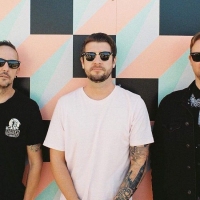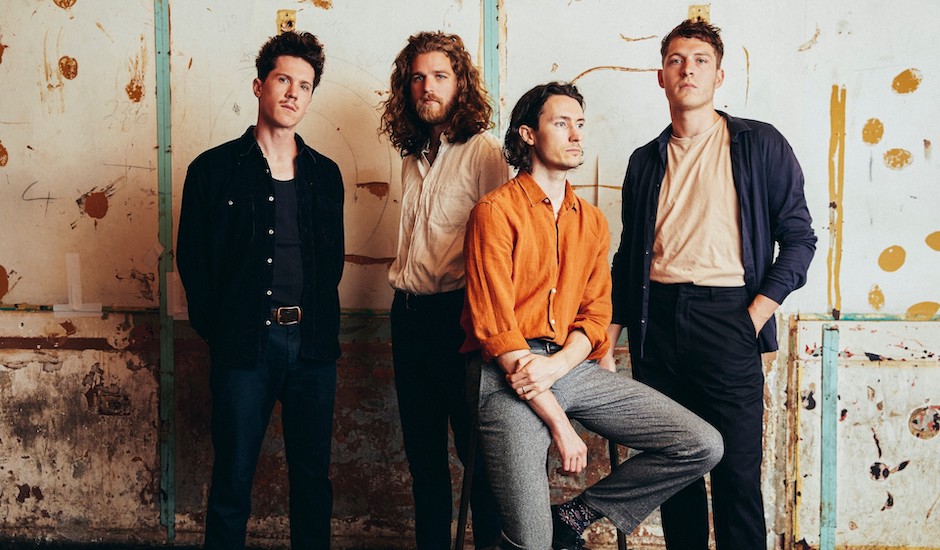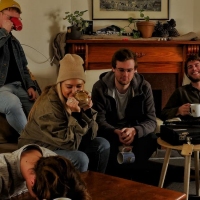 Premiere: Stone Lions bring a pop-punk punch with Take Me BackIt's the last cut from their upcoming new album Necking On and Kicking Off, out September 27th.
Premiere: Stone Lions bring a pop-punk punch with Take Me BackIt's the last cut from their upcoming new album Necking On and Kicking Off, out September 27th.

Album Walkthrough: City Calm Down dissect their glorious return, Television
The Melbourne band, often one to think beyond the thematic norm in their music, will tour the record this October.
Header photo by Sam Wong.
City Calm Down are always a band that'll go beyond where they have to. On last year's defining second album Echoes In Blue, the Jack Bourke-led Melbourne group detailed the negatives of impersonal digital communication and mindless reality TV amongst themes of mental health and motivational burn-out; a surprisingly dark and gloomy turn on an album created throughout 40-degree days in the Victorian summer. It was somewhat of a cathartic release for Bourke, who after having experienced the anxiety and fleeting energy as a result over-working during the recording of Echoes In Blue, learnt his lesson and refocused his creative process. "It’s been hugely therapeutic for me because I’ve realised I don’t really want to do that again," he says.
Now, just over a year later, the band step out the other side re-energised with their priorities more clear-cut and focused. On Television, the band's third album, they strip things back a touch musically to heavily emphasis the thematic underlays that lie amongst the swirling melodies, ensuring their messages are focused and direct; undistracted by overpowering melodies that often saturate important themes in other records. That's not to say that the album is dim or unexciting, however. While the album definitely has softer and more slow-paced moments, it still captures that distinct City Calm Down energy that have come to define the band, just cleaner and undisturbed; their message - and trademark sound - shining through in albeit a slightly different direction. "We want the songs to carry the same intensity they’ll have when we play them live," confirmed Jack. "We’ve always enjoyed playing and making music that has intense kinetic energy – we’ve been able to capture that energy better on this record, because we stripped away a lot of the things which previously got in the way."
Take the album's dizzying opening, it's title-track Television, for example. Amongst a pacing instrumental, Jack - joined by Sam Mullaly, Jeremy Sonnenberg and Lee Armstrong - questions the mass-consumption of media as racing guitars and crashing symbals dance around his brit-pop-esque vocal. On Flight, a nod to their earlier work, themes on social media and its impact on the present-day makes itself known through Jack's vocal, which seems to cut through punchy guitar riffs that are amongst the most explosive on the record, while on the album-closing Cut The Wires, that softer side of City Calm Down makes itself known; Jack dueting with backing vocals from Two People's Phoebe Cockburn as he sings about trust and relationships.
"We don’t want it to sound like we’re berating or patronising; music is supposed to feel weird and good. Jolt the listener, even if only for a second. We’re playing devil’s advocate. We don’t know what the right path is, but we are being seduced down the wrong one," Jack continues. "These songs came about as a result of exploring and questioning the way I live and how I should live."
With an upcoming headline tour in October - more information HERE - we go behind-the-scenes of Television, with an album walkthrough from Jack Bourke who dissects the album's themes and creation one track at a time. Dive into it below, while you get swept up in Television's confronting cries and pacing melodies.
Television
Television was written the same day I watched Sidney Lumet’s satire Network. I’d written the verses and the choruses in the afternoon and found Network on – you guessed it! – Netflix later that night. I was startled by the coincidental similarity of the themes in the song and the movie, and decided to adopt one of Howard Beale’s monologues for the song intro. The song isn’t as overtly cynical as the movie, but they both share a sense of distrust in ‘the media’ (as in, the fourth estate) and question the value of mass consumption of media.
My favourite line in the song is “Walter White still lights up the screen, shining on as the man of your dreams”. It’s absurd and gets to the heart of the song – Walter White is a horrendous character who can teach you a lot about yourself. Alternatively, you can binge-watch Breaking Bad without digging into those issues.
Visions of Graceland
I started writing this one while watching the movie Drive on mute. I thought it would be fun to try writing something to fit in with the soundtrack, a goal that wasn’t exactly realised. The lyrics started taking shape around the time Tony Abbott and his mates started trying to roll Malcolm Turnbull. I had the line, “I’m a lonely kid at home in this wasteland”, which felt apposite to the scorched Earth political strategy being employed by Abbott and co against Turnbull. The rest of the lyrics fell into place around that line.
Mother
I grew up in a household of five boys. My mum took on the primary caring duties for the five of us. We weren’t easy kids to look after: babysitters usually only lasted a couple of visits. I guess this song is a way of saying thanks to my mum (and dad) for putting up with the five of us. It also ties in with Visions Of Graceland in the sense that the petty behaviour of children is remarkably similar to the petty behaviour of certain members of our political class!
Stuck (On The Eastern)
This one went through a bunch of revisions before we settled on the final version. In fact, the only part that remains from the initial idea is the distorted harmonic hook at the start. The chorus was written in the studio after we decided to can the idea we went in with. I was hunting around for chords for a chorus, and Jeremy Sonnenberg (bass) started humming a melody over the top. After 3-4 hours of no progress, there was a light-bulb moment. We worked the melody and chords up from there and I wrote the lyrics on the spot – which rarely happens.
Lucy Bradley
I woke up one morning with the lead instrumental melody in my head. I wandered downstairs humming it and recorded it my phone – on the recording you can hear my wife Jess laughing at me and me telling her to shut up (politely, of course). I was able to pull most of the song together later that day and we finished it off in pre-production a few days later. It was a relief that it came together so quickly, given some of the others took so long.
Flight
Flight taps into themes I’ve explored on previous records – social media consumption and developing an opinion in a closed circuit – but perhaps it’s a bit more scathing in its view. The middle of this song was an absolute killer to execute. We were still working on it while we were in the final stages of mixing, and starting to feel like we weren’t going to make it when Burke [Reid, producer] came down with a brutal bout of the flu. We all felt very bad for poor old Burke, but it did allow us an extra couple of days to finish it off.
Weatherman
Probably the most difficult song to make on the record. At every turn, it avoided becoming a proper song. We had the lead guitar and chorus melody from very early on in the writing process, and kept making incremental adjustments during pre-production… I think it took about four hours to get the pre-chorus right. Then, when we got into the studio, it still wasn’t working. Burke and Lee (Armstrong, drums) eventually came up with the snare-free/tom-drum-only drumbeat, and things started to take shape. It wasn’t until the last hour of the last day in the studio, under intense pressure from Burke, that Will (Fletcher, guitar) threw away his inhibitions and unleashed his weird and warbley guitar part that gave the song its identity.
A Seat In The Trees
When I was little I used to climb trees. Looking back, I’m amazed neither of my parents would bat an eyelid at seeing their five-year-old climbing 5-10 metres off the ground. My dad would just tell me that if I was going to go up I had to know how to get back down, because he wasn’t going to climb up and help me! I don’t really have very fond memories of that period of my childhood, because I had a pretty bad time at early primary school. I think climbing trees was a way for me to escape the loneliness I experienced at school – by choosing loneliness in the trees I didn’t feel oppressed by it.
New Year's Eve
This was the first song written for the record. Like Stuck and Weatherman, it went through revision after revision. The thing I like most about this song is that the rhythm never lets you feel at ease, and this ties in with the lyrics, which draw on an episode of solipsism I experienced when I was about 10-years-old. I found this awfully confronting at the time and didn’t know how to explain the experience to anyone – my folks thought I had a lost the plot (which, I daresay I had).
Cut The Wires
In the final stages of recording the album, we drafted in the wonderful Phoebe Cockburn of Two People to help out with backing vocals. (I still believe the song is better with her singing the lead part.) Anyway, she asked me what the song was about, and I’m typically terrible at explaining that because I don’t think layers of meaning are easily reduced into a sentence or two. I told her the song was about challenging someone in a way that can only be done when you share a deep sense of mutual trust. I think, in this sense, it’s a song about my relationship with my wife, Jess, and my gratitude to her for always challenging me and pushing me further.
Tour Dates:
Fri 11 Oct | Manning Bar | Sydney, NSW
Sat 12 Oct | Lion Arts Centre | Adelaide, SA
Fri 18 Oct | The Triffid | Brisbane, QLD
Sat 19 Oct | Rosemount | Perth, WA
Sat 26 Oct | Croxton | Melbourne, VIC
Follow City Calm Down: FACEBOOK
 Premiere: Stone Lions bring a pop-punk punch with Take Me BackIt's the last cut from their upcoming new album Necking On and Kicking Off, out September 27th.
Premiere: Stone Lions bring a pop-punk punch with Take Me BackIt's the last cut from their upcoming new album Necking On and Kicking Off, out September 27th.
 Premiere: Meet Santa Fe Driving Range and their new song, Paper WallsThe Melbourne indie-pop group tease a bright future with their second song for 2019.
Premiere: Meet Santa Fe Driving Range and their new song, Paper WallsThe Melbourne indie-pop group tease a bright future with their second song for 2019.